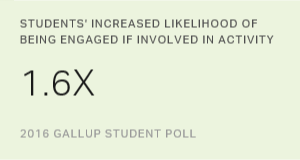Story Highlights
- Teacher stress is related to student success
- K-12 leaders can boost their ability to demonstrate care
- Prioritize your wellbeing to avoid caring paralysis
Gallup has studied more than 42 million employees and their emotional connection to and overall engagement with their workplace. When it comes to education, Gallup has spent more than 40 years studying teachers, principals and education leaders in thousands of school districts nationwide.
One of the key indicators of an education employee's engagement, and the school climate that results from it, is their response to this statement: "My supervisor, or someone at work, seems to care about me as a person."
How can we introduce caring in this new chapter of life that COVID-19 has created?
Caring begins with leadership. Leaders can only truly create engaged teams by demonstrating care, and conversely, being a great leader stems from an innate ability to show care.
So, in a school workforce that's more stressed than ever before, why are leaders struggling with what feels like professional impostor syndrome? Have they lost their innate ability to care?
Megan Dalla-Camina writes in Psychology Today, "The [impostor] syndrome is a psychological term referring to a pattern of behavior where people doubt their accomplishments and have a persistent, often internalized fear of being exposed as a fraud."
No, but their capacity for caring might be paralyzed.
Caring begins with leadership. Leaders can only truly create engaged teams by demonstrating care, and conversely, being a great leader stems from an innate ability to show care.
The pain of change isn't new. According to experts at the University of Missouri, even prior to the pandemic, "…findings suggest many teachers are not getting the support they need to adequately cope with the stressors of their job," Keith Herman, a professor in the MU College of Education said. "The evidence is clear that teacher stress is related to student success, so it is critical that we find ways to reduce stressful school environments while also helping teachers cope with the demands of their jobs."
Are Shame and Stress Paralyzing Your Capacity for Caring?
Stressors are not the same as they were a month ago, two weeks ago or even yesterday, and that will not be changing anytime soon. The pace of change is quicker than ever before, and leaders are trying to play catch-up while managing the tactics of the day. It can feel like treading water while holding a basket as someone throws brick after brick into it.
The challenge of this unusually high stress might be that leaders are internalizing a false narrative that they are failing, drowning and unworthy of care. They read article after article in attempts to learn the mechanics of better leadership, but they forget to care for themselves in the midst of it, and this results in a toxic shame spiral.
As Dr. Brené Brown reminds us, "shame [is] the intensely painful feeling or experience of believing that we are flawed and therefore unworthy of love and belonging -- something we've experienced, done, or failed to do makes us unworthy of connection."
In essence, shame paralyzes leaders and can freeze their ability to care about themselves, which trickles down to their teams and even their students. The more the internal voice of shame kicks in, the more superintendents and principals flounder in their wellbeing and feel like impostors.
So, what can you do as a leader to boost your ability to demonstrate care to your team?
Be Authentic in Your Choices
First of all, leaders, know you aren't alone nor solely responsible for carrying the torch of caring throughout your institution. When asked to consider the recent impact of COVID-19, less than half of U.S. employees (45%) strongly agree that their organization cares about their overall wellbeing.
While it's easy to focus on the word "supervisor" in this statement: "My supervisor, or someone at work, seems to care about me as a person," we can't miss the culture of care that needs to surround them in order for them to keep carrying the torch. Leaders aren't called to independently carry the burden of caring, rather caring needs to come from every role in the school. However, leaders are called to model such behaviors and that modeling is contagious in their districts and schools, and it starts with authenticity.
The pace of change is quicker than ever before, and leaders are trying to play catch-up while managing the tactics of the day. It can feel like treading water while holding a basket as someone throws brick after brick into it.
Bill George, the former CEO of Medtronic and a Harvard professor states, "I believe that leadership begins and ends with authenticity. It's being yourself; being the person you were created to be." Brené Brown expands on such thinking: "Authenticity is a collection of choices that we have to make every day. It's about the choice to show up and be real. The choice to be honest. The choice to let our true selves be seen."
To lead through change, to break the focus on shame and be the leader the district has called you to be, start by owning your own leadership lens and wellbeing. If you lead in this way, others will follow.
By loving yourself where you're at, modeling vulnerability, and being the leader you were created to be, your followers will trust, lean into, and model your behaviors. Your team of leaders is already looking at you, why not give them the "real you" to lead them through your journey together?
Focus on the following areas to shore up your self-care and plan for tomorrow.
1. Aim Toward Hope
"We must nurture that sense of shame: once it has solidified in his mind, there will be some room for hope," said Roman philosopher Seneca over 2,000 years ago. As the late Gallup Senior Scientist Dr. Shane J. Lopez (2016) reminded us, hope is the belief that "the future will be better than the present," along with the belief that "[you] have the power to make it so." Leaders, can you take the time to pause in your day and journal about what you hope for the next day/week/month? That slight pause every day will pay dividends as you model hope for your teams.
2. Invest in Relationships
In Gallup's understanding of engagement, the Q12 item "I have a best friend at work" proves vital to fostering a sense of belonging. A best friend is someone who is a confidant, who makes you feel safe, and who you can be vulnerable with. Leaders, who can you seek to build intentional friendships with? Principals may find such relationships with others in similar roles at other schools, while superintendents may seek those outside their district in similar roles.
Hope is the belief that "the future will be better than the present," along with the belief that "[you] have the power to make it so."
The important thing is to find someone you are willing to be authentic with, and with whom you can share your false narratives and will help you break the shame cycle. Such investment will not only be a powerful, calming mechanism in your life but will create a model for others around you to emulate.
3. Play to Your Strengths Daily
Each of your employees will react differently in times of disruption and their strengths will influence those reactions. Individualizing is key, and understanding an employee's strengths can be an excellent way to do just that.
Consider this: 67% of employees who strongly agree that their manager focuses on their CliftonStrengths are engaged -- that percentage plummets to 2% when employees strongly disagree. As a leader, where are you at your very best? What does your CliftonStrengths report say you do differently than other leaders? How can you focus on what's strong versus what's wrong?
It is more challenging than ever for a leader to fight through the paralyzing forces of stress and shame to care for yourself and your own wellbeing in order to authentically demonstrate caring for your teams. As Deepak Chopra points out: "A forced positive mind can be a turbulent mind, what you need is a quiet mind which is a healing mind. And don't forget to practice love in action. Love without action is meaningless. Action without love is irrelevant."
Love in action begins with you, leaders. When you embrace change and vulnerability with open arms and prioritize your own wellbeing, you can avoid caring paralysis. Amidst unprecedented change and stress, this just might be the key to your own leadership sustainability and resilience, along with that of your teams, teachers and the students and families you serve.
Leadership begins with caring. Use these Gallup resources to navigate your school's new environment through the COVID-19 disruption:
- Use Gallup's talent-based hiring programs to measure the potential talent of your school district's candidates to select the very best for your school.
- Discover action items in Gallup's bestselling book CliftonStrengths for Students to help you discover and develop your strengths and reach your full potential so you can help your students reach theirs.
- Check out our resource page, COVID-19: Leading Through Disruption.






